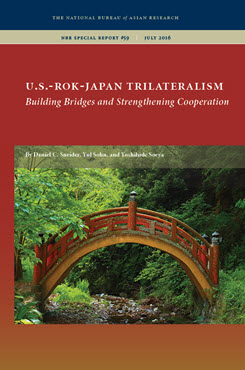Advancing Trilateral Cooperation
A U.S. Perspective
This essay analyzes the U.S.-Japan-ROK trilateral relationship from a U.S. perspective and highlights the critical role that the U.S. has played in mediating tensions between South Korea and Japan.
EXECUTIVE SUMMARY
MAIN ARGUMENT
The prospects for trilateral cooperation in Northeast Asia between the U.S. and its two principal security allies in the region, Japan and the ROK, have dramatically improved in the last year. In December 2015, the two governments reached a historic agreement to settle one of the most sensitive issues arising out of the wartime past: the treatment of Korean women coerced into sexual service by the Japanese Imperial Army, the so-called “comfort women.” Driven by North Korea’s unchecked pursuit of nuclear weapons and ballistic missile delivery systems, as well as by China’s aggressive actions in the South China Sea, all three countries now have a greater sense of shared security perceptions. The progress made on trilateral cooperation required considerable political leadership on all sides, most of all from Japan and the ROK, but also from U.S. officials. Although the U.S. has historically sought trilateral cooperation, it has been reluctant to intervene in the difficult relationship between Japan and South Korea. In the past, however, progress has depended on the U.S. performing a mediating role, and that was also true in the case of the recent steps forward. The U.S. needs to sustain its leadership role to ensure that trilateral cooperation is strengthened and solidified.
POLICY IMPLICATIONS
- The U.S. should offer further ideas on how all three countries might promote reconciliation in order to avoid backsliding on history issues. These could include jointly producing supplementary teaching materials on the wartime period, organizing dialogues among historians, facilitating exchanges among museum directors, and funding and organizing large-scale student exchanges.
- Trilateral consultations should expand beyond traditional security and military issues. The three countries should discuss coordinated responses in diverse policy areas, all of which have clear security implications.
- Areas for policy consultation could include energy security, humanitarian assistance and disaster relief, cybersecurity, and intellectual property protection.
- The U.S. needs to sustain attention to trilateral cooperation and facilitate the process of reconciliation over painful historical issues, as exemplified by President Obama’s decision to visit Hiroshima.
Daniel C. Sneider is the Associate Director for Research at the Walter H. Shorenstein Asia-Pacific Research Center at Stanford University.


